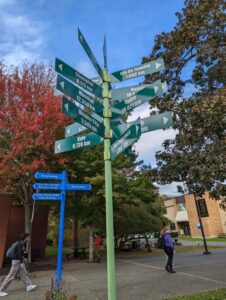To combat labour shortages, the federal government has temporarily lifted the 20-hour-per-week work limit for international students from November 15, 2022 until December 31, 2023. Student groups are happy for the change as it will help lighten international students’ financial burden.
Camosun College Student Society (CCSS) external executive Jessie Niikoi is excited about this new opportunity for international students because of the high cost of living in Victoria.
“There’s two sides to it, you know,” says Niikoi. “First, because of the time we’re in, and how expensive everything is, this is actually a great decision because it’s been so hard ever since inflation hit for students to afford things or for students to live in an affordable environment… So, this limit that’s been lifted for international students is such a great decision. We’re happy that this is happening.”

British Columbia Federation of Students (BCFS) chairperson Melissa Chirino is also looking forward to this change after years of advocating for it. She says it’s a great first step in the right direction for international students to support themselves and choose a work environment they feel safe in. However, there’s still lots of work to be done.
“We’ve been asking for this for years,” says Chirino. “It’s great, but we also know there’s a lot of work that has to be done still… Now that they’re able to work more than 20 hours, we know in the past, there have been some cases of international students working under the table, and then it ends with them being deported, but that part of it is no longer there, and they can support themselves in another country and feel safe doing so.”
Chirino says that the next step is regulating tuition fees for international students so they can afford to live in Canada without struggling to pay its high costs.
“We recognize the next step includes alleviating the cost of education,” says Chirino. “Students, in general, are struggling with the cost of education… I think sometimes people forget that not all international students have tons of money saved up to pay for their international fees that keep increasing along with the high rent prices… Hopefully, in the future, we can decrease fees and make it more sustainable for everyone to get their education.”
Niikoi hopes that international students don’t end up working too much; she wants them to remember they are here on study permits and need to keep their focus on school.
“The other side is my general fear [about] how students are going to use this and how they’re going to balance their school and work life, because some people can start to focus on work more than school,” says Niikoi. “I just hope students are able to actually stay in school and stay on top of their classes, because it’s a pilot program… So I feel like the government is going to have a look at the economic and academic impact it’s going to have.”
Even though the 20-hour-per-work-week limit is lifting for one year, the BCFS won’t stop advocating to make this change permanent and also to regulate tuition costs for international students.
“We will keep advocating for them to not get rid of it and make it a permanent thing,” says Chirino. “Like I mentioned before, we’ve been advocating for this. It’s been one of our asks of the government, so we’re going to keep talking about this even though a change has been established, because it is temporary, and we do think that getting rid of it after this year of seeing how it goes wouldn’t be helpful for anyone. So, we’re going to see how it goes to make it a permanent change.”
